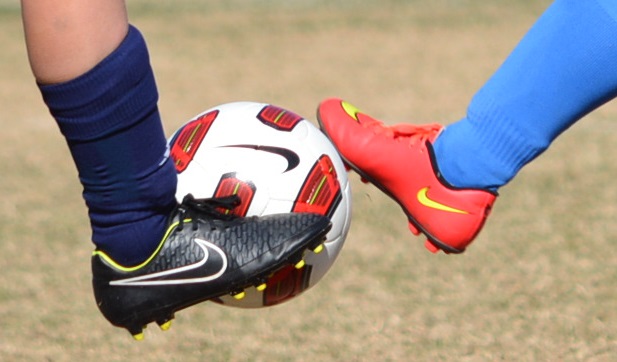Dougherty: High school coaches, don’t forget to write a Thank You card

 This column is 30 years in the making. Ok, perhaps not this specific column. But the information, knowledge and experience I hope to share with you in this, and future, columns is the result of three decades of coaching youth soccer.
This column is 30 years in the making. Ok, perhaps not this specific column. But the information, knowledge and experience I hope to share with you in this, and future, columns is the result of three decades of coaching youth soccer.
Ronald Reagan was late into his second term, Whitney Houston was at the top of the pop music charts (though I was listening to Rush and U2, most likely), and “ThirtySomething” debuted on ABC-TV when I began my youth coaching career just a few months out of college. It was September 1987, and little did I know how much youth soccer I would coach and watch over the next 30 years.
While I’d like to say I’ve seen it all, I know I haven’t. Somewhere in the not-so-distant future – perhaps even this weekend – something will happen on a youth soccer field that will cause people to scratch their heads and think, “Did that just happen?”
+COLUMN: Scored a goal? Great, now go thank your teammate
But I have seen a lot:
· All-out brawls on the sideline of a U16 game in New Jersey
· A referee blowing the whistle while the ball was in mid-flight off of a corner kick; then disallowing the goal that resulted seconds later “because time ran out.”
· Injuries of every kind
· Coaches going ballistic over the dumbest things (yours truly included)
· Absolutely horrid field and weather conditions – and the games went on
· Ridiculous – and I mean ridiculous – parental behavior on the sideline
· Some terrible – and some brilliant – youth soccer
· A commitment and love of the game from volunteers that will bring tears to your eyes.
I’ve seen a lot of “airport teams” – those teams that look really, really good walking on to the pitch from the parking lot, then struggle to string three passes together. And I’ve seen a team that looked like a bunch of scrubs play some of the most beautiful youth soccer I’ve ever seen.
I’ve also been blessed to learn from a variety of coaches who brought their on perspectives to how the game ought to be played, and the best teaching methods for the American youth player.
My goal with this weekly column is to share all of this – and more – with you. Yes, I’ll write about the professional game at times, and perhaps about major events, including the World Cup. But the focus will always be the youth player, the coaches who teach them, and the parents who are invested in them.
+READ: What college coaches want in a player
I suspect that, at times, you’ll nod your head in agreement. And other times, you’ll shake your head and mumble, “What a moron.” Whichever way you lean on a given week, I encourage you to share your thoughts. I’d love to hear from you. Be respectable, of course, but share your convictions. I welcome the feedback.
***
I’ve been watching some high school soccer lately, and generally like what I see. One key reason: better fields. More and more high schools have wider, turf stadium fields – a far cry from the 55-yard-wide grass fields that never recover from the first rainy game of the season. With more space and a better surface on which to play, players have the opportunity to play better, more attractive soccer.
Still, if high school soccer is getting better, the biggest factor isn’t the fields or the high school coaches. It’s the club teams that feed the high schools.
Find a good boys or girls high school soccer team, and I’ll show you the youth club responsible for producing the talent that high school coaches have the pleasure to lead. Indeed, high school coaches are the beneficiaries of somebody else’s work, as they get to choose from a pool of players that has already received thousands of hours of training from club coaches who taught the kids how to receive a ball, dribble, pass, shoot and defend.
That’s not to bash high school coaches, of course. Quite a few are very good, and through their coaching they help players develop important leadership skills and teach them how to deal with the pressures associated with representing their schools.
But don’t be mistaken; coaches of high school teams are not responsible for player development. In fact, many veteran youth club coaches have made the case to me that they need a month after the high school season to re-teach their players certain fundamental skills that were ignored during high school play (which is why some club coaches encourage their players to skip the high school season altogether. More on that in another column).
To me, the first thing a high school coach ought to do after his or her team wins a district, regional or state title is to call and thank the club coaches responsible for providing the talent. That would go a long way toward easing the tensions that sometimes exist between club and high school coaches.
That, of course, requires self-awareness, humility and appreciation for the work of others. It may be too big of an ask.
SOCCERWIRE MARKETPLACE
- visitRaleigh.com Showcase Series 2025, hosted by NCFC Youth
- OFFICIAL MANCHESTER CITY SOCCER CAMPS
- Wanted Licensed Youth Soccer Coach
- Join Official Elite Summer Soccer Camps with Europe’s Top Pro Clubs!
- The St. James FC Travel Staff Coach - North (Loudoun) & South (Fairfax)
- The St. James FC Girls Academy (GA) Head Coach - 2 teams
- The St James FC Boys Travel Tryouts
- OFFICIAL BAYERN MUNICH SUMMER CAMPS U.S.
- JOIN THE ALLIANCE!
- OFFICIAL FC BARCELONA CAMPS U.S.











